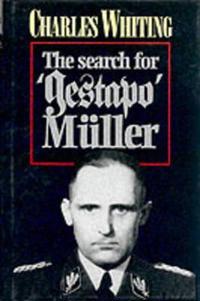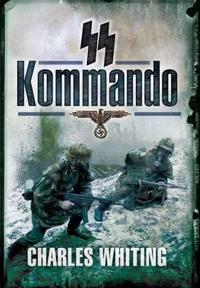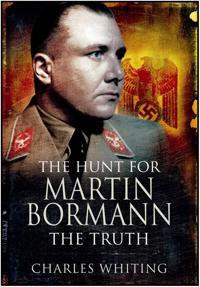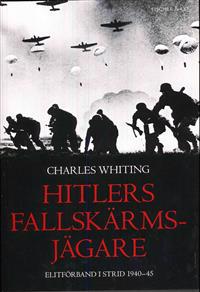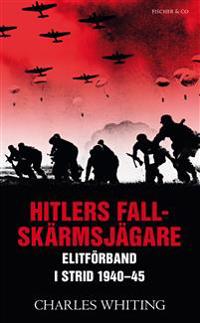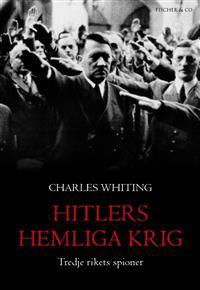Ghost Front (Inbunden)
avCharles Whiting
ISBN: 9780306811487 - UTGIVEN: 2002-04While much has been written about the Battle of the Bulge--Hitler's gigantic counteroffensive in the Ardennes Forest--the question of exactly how Germany was able to secretly mass its strategic reserves opposite the U.S. front remains as shrouded in mystery today as it was at the time. In December 1[...]
The Search for Gestapo Muller (Inbunden)
avCharles Whiting
ISBN: 9780850527742 - UTGIVEN: 2001-06On April 29th, 1945, General Heinrich Gestapo Muller, head of that feared Nazi organisation, left Hitler's bunker and disappeared. Today over a half a Century later, he is still carried on the books of the German Office of Investigation of Nazi war crimes as their No. 1 wanted man - The question is [...]
American Hero (Inbunden)
avCharles Whiting
ISBN: 9780953867707 - UTGIVEN: 200010The life and death of Audie Murphy.
The Battle of Hurtgen Forest (Inbunden)
avCharles Whiting
ISBN: 9781580970556 - UTGIVEN: 2000-11The U.S. Army regards the Hurtgen Forest as one of the most desperate battles it has ever fought. Flanking the key German city of Aachen, the forest was one of the formidable natural barriers interspersed with German fortifications in the West Wall in September 1944.[...]
The Last Assault (Pocket)
avCharles Whiting
ISBN: 9781844152223 - UTGIVEN: 2005-04It has generally been assumed by historians of the Second World War that the Americans were caught completely unawares by the last great German Offensive - the drive into the Ardennes in December, 1944, known as the Battle of the Bulge. In this remarkable reappraisal, best-selling military historian[...]
Kommando (Pocket)
avCharles Whiting
ISBN: 9781848842755 - UTGIVEN: 201004The vast number of written accounts studying the British Special Forces in the Second World War overlook the fact that the Germans were actually the first to utilize this unconventional style of warfare. Indeed, two days before the official declaration of war German commando units disguised as Poles[...]
The Hunt for Martin Bormann (Häftad)
avCharles Whiting
ISBN: 9781848842892 - UTGIVEN: 201010On the night of 1 May 1945 Martin Bormann, head of the Nazi Party Chancellery and private secretary to Adolf Hitler, fled Fuhrer's bunker into the ruins of Berlin. His subsequent disappearance became the source of countless rumours and wild speculation over the years, even including a theory that he[...]
Skorzeny (Häftad)
avCharles Whiting
ISBN: 9781848842960 - UTGIVEN: 201007Skorzeny was one of the most daring figures of the 20th Century. His exploits included the rescue of Mussolini from his mountain prison, a brief affair with Eva Peron, a blackmail attempt on Winston Churchill and the kidnapping of the son of the wartime dictator of Hungary. Eisenhower declared him "[...]
Ss Peiper (Pocket)
avCharles Whiting
ISBN: 9781848848610 - UTGIVEN: 201207On the night of 14 July, 1976 - Bastille Day - an elderly German was brutally murdered in a little French village where he had taken refuge from the evil shadow which had dogged him for the past thirty-two years. His killers were never brought to justice; indeed, no real attempt was ever made to tra[...]
Patton's Last Battle (Inbunden)
avCharles Whiting
ISBN: 9781862271494 - UTGIVEN: 2001-05Charles Whiting tells the dramatic story of General George Patton's final months, following him over the Rhine to help deliver the fatal blows to Hitler's Third Reich, to his death, in bed, in December 1945.[...]
Hitlers fallskärmsjägare : elitförband i strid 1940-45 (Inbunden)
avCharles Whiting
ISBN: 9789185183524 - UTGIVEN: 200809Rättvis, nyanserad och spännande.
Så beskriver general Kurt Student, befälhavare över de tyska fallskärmsjägarna under andra världskriget, denna bok om hans egna förband.
Hitlers fallskärmsjägare är ingen glorifiering av nazisternas luftburna trupper, men inte hel[...]Hitlers krigare : SS sista strid (Pocket)
avCharles Whiting
ISBN: 9789185183609 - UTGIVEN: 200811Hitlers elitsoldater i Leibstandarte SS skulle utgöra den tyska krigsmaktens spjutspets. Men där striderna rasade som värst blev också förlusterna som störst. Många gick under när nazisterna på front efter front tvingades retirera från amerikanska, brittiska och sovjetiska trupper. Och i t[...]
Hitlers fallskärmsjägare : elitförband i strid 1940-45 (Pocket)
avCharles Whiting
ISBN: 9789185183692 - UTGIVEN: 200907De betydande luftlandsättningsförband som skapades inom Hermann Görings Luftwaffe kom att bli ett mycket viktigt inslag i Hitlers nya krigsföring: blitzkrieg. De kallades fallskärmsjägare och infiltrerade de allierades linjer från luften. Så snart de slog i marken var de redo för strid.
Tredje rikets sista dagar (Pocket)
avCharles Whiting
ISBN: 9789185183937 - UTGIVEN: 201005Så sent som 4 januari 1945 gjorde general Patton följande notering i sin dagbok: Vi kan fortfarande förlora detta krig. Eisenhowers arméer hade vid den tidpunkten förlorat mer än 300 000 man i strid och de befann sig fortfarande på samma positioner som de hade vunnit tre månader tidigare. Ty[...]
Hitlers hemliga krig : tredje rikets spioner (Inbunden)
avCharles Whiting
ISBN: 9789185183982 - UTGIVEN: 201010Under andra världskriget bedrevs en intensiv spion- och underrättelseverksamhet från de olika stridande sidorna. Inte sällan var uppgifter från denna verksamhet avgörande för krigslyckan.
I Hitlers hemliga krig berättar Charles Whiting om Nazitysklands spioneri utifrån intervjuer ha[...]Tredje rikets sista dagar (Inbunden)
avWhiting, Charles
ISBN: 9789185183739 - UTGIVEN: 2009-08-24Så sent som 4 januari 1945 gjorde general Patton följande notering i sin dagbok: Vi kan fortfarande förlora detta krig. Eisenhowers arméer hade vid den tidpunkten förlorat mer än 300 000 män i strid och de befann sig fortfarande på samma positioner som de hade vunnit tre månader tidigare. T[...]


